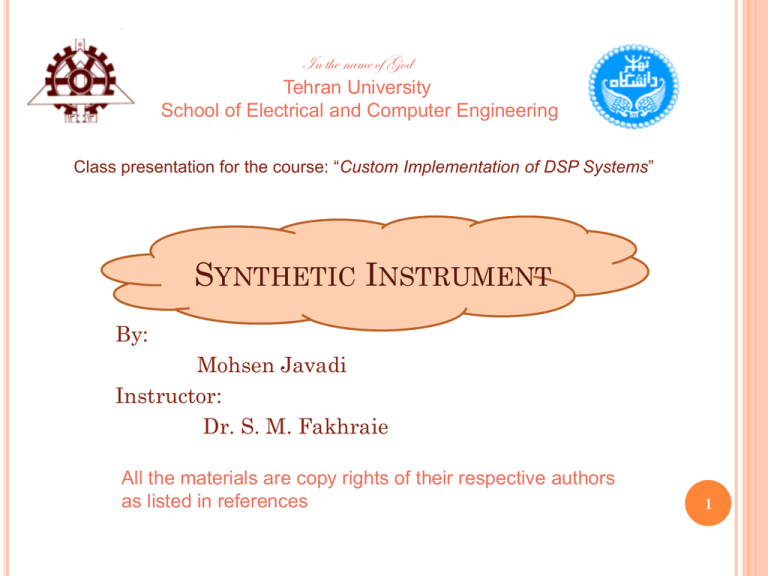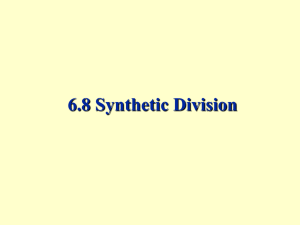Synthetic Instrument
advertisement

In the name of God Tehran University School of Electrical and Computer Engineering Class presentation for the course: “Custom Implementation of DSP Systems” SYNTHETIC INSTRUMENT By: Mohsen Javadi Instructor: Dr. S. M. Fakhraie All the materials are copy rights of their respective authors as listed in references 1 OUTLINE History of Automated Measurement Synthetic Instruments Advantages of Synthetic Instruments Vector Signal Analyzer Implemented as a Synthetic Instrument 2 HISTORY OF AUTOMATED MEASUREMENT people started using these inexpensive computers to control measurement devices measurements to be made faster The knowledge for operating the instruments is encapsulated in software that anybody can run With computer-controlled measurement devices, you still needed a separate measurement device for each separate measurement It seemed fortunate that you didn't necessarily need a different computer for each measurement. 3 HISTORY OF AUTOMATED MEASUREMENT rack-em-stack-em putting all these computer-controlled instruments into one big en-closure They could have a whole slew of measurements made with the touch of a button The computer would run all the instruments and record the results some systems got so big that you needed to carry 4 HISTORY OF AUTOMATED MEASUREMENT Modular Instruments measurement instruments were put into smaller, plug-in packages that connected to a common bus Modular packaging can eliminate redundancy Modular design saves money in theory. In practice, however, cost savings are often not realized with modular packaging when you want to add another instrument, you add another measurement specific hardware module 5 Modular Instruments [6] SYNTHETIC INSTRUMENTS With a synthetic instrument, ideally you add nothing but software to add another instrument Digital hardwired logic versus CPU[3] A LabVIEW based RF Synthetic Instrument[6] 6 SYNTHETIC INSTRUMENTS Many of these benefits are a direct result of the modularity aspect of the SI, which consists of The sampled data delivered by the ADC in a DSP-based instrument can be used to analyze different attributes of the input signal 7 Synthetic Instrument Context[4] SYNTHETIC INSTRUMENTS The sampled data time series can be analyzed to extract time-domain attributes of the signal The most common signal processing task is the transformation of the time series to its spectral representation Frequency-domain attributes and parameters extractable from the transformed signal include frequency, bandwidth, transfer functions, and gain and phase distortions 8 SYNTHETIC INSTRUMENTS Direct analysis of the sampled time series offers a high-detail time-localized sample-by-sample analysis of its spectral representation offers a low-detail, long-time averaged examination Modern DSP technology offers a third level of time signal analysis to disclose and quantify underlying short-term time-domain signal structures example of a middle-detail time analysis of a sampled data signal is its time-varying amplitude and phase profile not observable in the time series or its spectral representation 9 SI front- and back-end options[1] ADVANTAGES OF SYNTHETIC INSTRUMENTS Eliminating Redundancy Power Supply Front Panel Controls Computer Interfaces Computer Controllers Mechanical Enclosures Signal Processing Measurement Integration The data set is seen as an integrated whole that is analyzed, categorized, and visualized This is in contrast with the more prevalent way of approaching test where a separate measurement is done in a sequential process with each test 10 ADVANTAGES OF SYNTHETIC INSTRUMENTS Measurement Speed synthetic instrument does a measurement that is exactly tuned to the needs of the test being performed. Nothing more, nothing less For example, there is a speed-accuracy trade-off the most efficient measurement techniques and algorithms can be used Longer Service Life Synthetic measurement systems can be reprogrammed 11 Reduce costs by reusing hardware for many applications[6] VECTOR SIGNAL ANALYZER IMPLEMENTED AS A SYNTHETIC INSTRUMENT 12 QUADRATURE MODULATION s(t)= A(t)cos(ω0t + θ(t)) s(t, nTSym)= An cos(ω0t + θn) s(t, nTSym)=An cos(θn)cos(ω0t)−An sin(θn)sin(ω0t) In=An cos(θn) Qn=An sin(θn) s(t, nTSym)=In cos(ω0t) − Qn sin(ω0t) QAM modulator for the input vector I(n)+ jQ(n)[1] 16-point constellation with a binary Gray code[1] 13 QUADRATURE DEMODULATOR it must estimate and remove unknown frequency and phase offsets of the quadrature oscillator and time sampling process VSA does not require all of this support there are channel and implementation effects; thus, there will be a difference betweenthe modulator input and the demodulator output 14 Constellation space showing a demodulated I–Q point, possible modulated I–Q points, decision boundaries, and an error vector[1] QAM demodulator[1] VSA Synthetic Instrument Context[4] Baseband sampled 16-QAM demodulator [1] 15 16-QAM modulator [1] VSA. High-quality DSP-based receiver [1] VSA IMPLEMENTATION A normal receiver will include an equalizer The VSA-based receiver does not use its equalizer in the same fashion The radio receiver section of the VSA instrument must acquire carrier frequency and phase from the modulated signal to perform its demodulation task This is performed with a high-quality DSP-based PLL To minimize phase jitter in the demodlation process, the PLL bandwidth must be small to acquire it in reasonable time and with a reasonable offset frequency, the PLL bandwidth must be large the loop bandwidth is variable 16 VSA IMPLEMENTATION the radio receiver part of the VSA instrument must accommodate input signals with arbitrary bandwidths and arbitrary symbol rates To control the complexity of the signal collection process the VSA front end will likely have a fixed antialiasing filter a high-performance ADC operating at a fixed input sample rate The processing performed by the VSA must include the option of arbitrary resampling from the fixed input sample rate The timing jitter introduced by the resampling operation must be significantly smaller than the timing jitter expected to be measured This means the arbitrary resample must be of extremely high quality 17 EVM Demodulated constellation and EVM plots of a healthy modulator [1] 18 Demodulated constellation and EVM plots for a modulator with phase jitter [1] EVM [1] 19 [1] REFERENCES 1) Robert Wade Lowdermilk, Member, IEEE, and fredric j. harris, Life Fellow, IEEE ,“Vector Signal Analyzer Implemented as a Synthetic Instrument”, 2009 IEEE 2) Gaetano Pasini’, Pier Andrea Traverse', Domenico Mirri’, Gaetano Iuculano3, Fabio Filicori ,“Hardware Implementation of a Broad-Band Vector Spectrum Analyzer Based on Randomized Sampling”,IMTC 2004. 3) “ Synthetic Instruments Concepts and Applications” ,Copyright © 2005 Elsevier Inc 4) Peter Pragastis, Michael N. Granieri ,“The Up Converter – A Critical Synthetic Instrument Technology”,2008 phase matrix 5) Joe Fleagle ,“TRADEOFFS IN SYNTHETIC INSTRUMENT DESIGN AND APPLICATION”,2005 IEEE. 6) http://zone.ni.com/devzone/ 20 Thanks For Your Attendance 21









